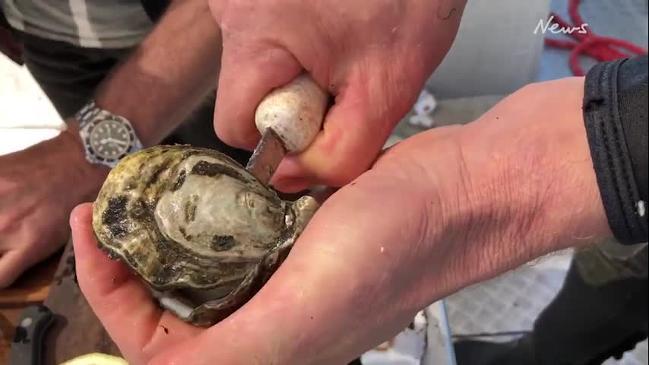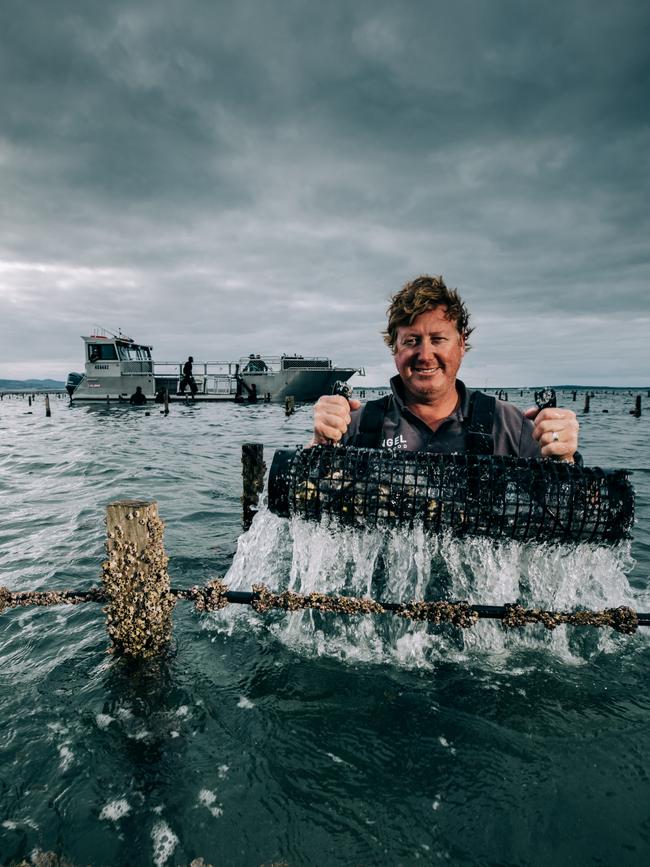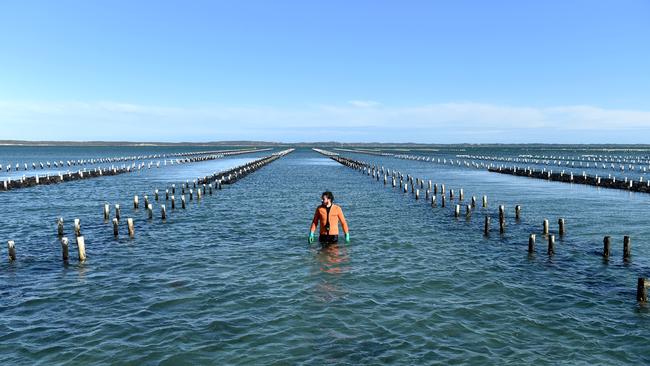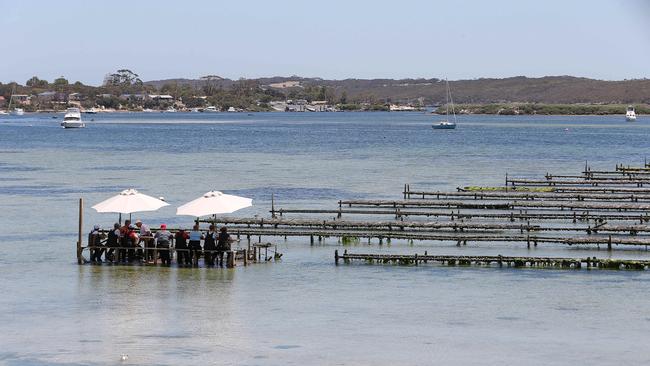Casual workers stood down as Coffin Bay gastro-like outbreak rocks SA’s oyster industry
Casual workers are being sent home from west coast oyster farms after the industry was left fearing for its future after a government-imposed shutdown.

SA News
Don't miss out on the headlines from SA News. Followed categories will be added to My News.
Workers are being stood down after SA’s $28m oyster industry was rocked by a week-long government-imposed halt to harvesting at Coffin Bay farms.
The state has recorded 45 cases of a seafood-related infection over the past two months, most linked back to Coffin Bay on the Eyre Peninsula, which has the state’s highest concentration of farms.
The Department of Primary Industries and Regions SA (PIRSA) says the closure, which affects about 32 producers, is expected to be in place until early next week.

Angel Seafood chief executive Zac Halman said the company had stood down casual workers amid the “devastating” effects of the closure.
About 50 permanent staff work across the business’s main operations at Coffin Bay, along with other oyster farms around the state.
“We’ll have a reasonable loss if produce does get recalled,” Mr Halman said. “We’ve got a lot of produce out in the market place.
“We’re all in limbo at the moment. A loss like this is a pretty deep cut for everyone just before the Christmas period.”
However, Mr Halman said oyster farmers were resilient, and this was a chance to ensure that producers and those in the supply chain were following correct procedures.
“It’s a good reality check to make sure people are doing the right thing – it just comes at a bit of a cost,” Mr Halman said.
Cappo’s Fish Market owner Matt Cappo, who only sells Coffin Bay oysters, took them off the shelves this week in response to the closure.
“We’ll put them back in the window when the government says everything’s OK,” he said.
SA Oyster Growing Association chairman Rob Kerin said growers were concerned people’s perceptions of food safety problems would affect all producers – not just those in Coffin Bay.
Vibrio parahaemolyticus is a bacteria that can occur in coastals waters, but it is believed environmental conditions may have recently caused changes to the amount of it in oyster production areas.
The presence of the bacteria itself is not a problem – but it can cause illness in people if oysters are not kept at the right temperature, and then eaten raw.
“This year for some reason, we’re getting a lot more of it. It may be because there’s been some big winds and a couple of rain events that may have stirred it up on the ocean floor and into the water column,” Mr Kerin said.
The concern relates to foodborne vibrio parahaemolyticus (Vp) infection, which is associated with eating undercooked seafood.
It causes gastro symptoms including watery diarrhoea, abdominal cramps, nausea, vomiting, fever and headache, which usually occur within 24 hours of eating the contaminated food.

PIRSA executive director of biosecurity Nathan Rhodes said the closure meant no oysters could leave Coffin Bay.
“This precautionary closure has been put in place to … trace back recent cases and enable further investigations,” he said.
Mr Rhodes said it was believed high temperatures had led to higher amounts of bacteria, linked with the outbreak.
“PIRSA has consulted with industry, who have supported the closure, and has been working with SA Health on the public health impacts of the outbreak,” he said.
Mr Rhodes said many growers had already voluntarily stopped harvesting.
SA Health issued an alert about eating raw oysters on Friday, following a rise in Vp infection cases. The 45 cases linked to eating raw oysters compares with none last year and eight in 2019.
Mr Rhodes said his department was working with industry to ensure best-practice quality controls were in place among the rest of the state’s oyster producers.
About 300 people are directly employed at oyster farming businesses throughout the state.
In 2019-20, oyster farming contributed $28.3m to SA’s gross state product.
South Australian Oyster Growers Association executive officer Lynlee Lowe said it was too early to tell the financial impacts of the closure – but it was coming at a very difficult time.
“If it’s resolved in a week it will be minimal but if it lasts longer than that, if it goes for weeks, obviously it will be quite substantial,” she said.

Mrs Lowe said oyster businesses were in “a bit of shock” grappling with the situation.
“This is one of the busiest times leading up to Christmas. They can still work on their farms – they just can’t sell,” she said.
Mark Jarvis, who owns Oysters Amalgamated, said it was “devastating” for his Coffin Bay business, though he could still sell from his Cowell farm.
“We were looking forward to a really good summer and now we’re not going to get the sales out of Coffin Bay,” he said.
Mrs Lowe said the growers’ association was “deeply concerned” about the recent cases of vibrio parahaemolyticus and was helping identifying the source.
“We are examining highly unusual environmental conditions – something which has not been seen before in South Australia, which have coincided with this outbreak,” it said in a statement.
The association said SA growers take food safety seriously and work with their partners to educate them about safe food practices.
The situation follows a series of tough years marred by the pandemic and Pacific Oyster Mortality Syndrome (POMS).
“We’ve already gone for five years with reduced sales, but it will be a financial burden for a lot of people,” Mr Jarvis said.
To minimise the risk of contracting the illness, raw unshucked Pacific oysters should be stored at below 10C and shucked oysters should be stored at less than 5C.
One Advertiser.com.au reader said her husband had suffered a week of illness after eating raw oysters last Wednesday.





